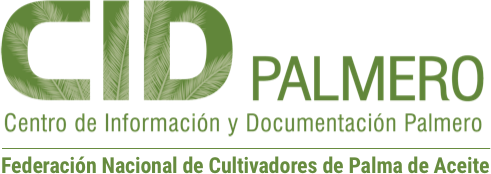| dc.creator | Escobar, Ricardo | |
| dc.creator | Sterling, Francisco | |
| dc.creator | Peralta, Francisco | |
| dc.date | 2000-01-01 | |
| dc.date.accessioned | 2020-07-25T11:17:56Z | |
| dc.date.available | 2020-07-25T11:17:56Z | |
| dc.identifier | https://publicaciones.fedepalma.org/index.php/palmas/article/view/841 | |
| dc.identifier.uri | http://repositorio.fedepalma.org/handle/123456789/139468 | |
| dc.description | As of 1967, ASD initiated an exchange of oil palm materials with genetic improvement programs from other countries. The efforts of the ASD genetic improvement program have been concentrated mainly in the improvement of the Deli Dura lines introduced from the five Asiatic stations mentioned before and from the AVROS pisiferas sources, Ekona and Calabar. This has resulted in the significant progresses, especially with the Deli Dura materials from Chemara and Dami and with the pisiferas Ekona and Calabar sources. ASD's Deli x AVROS planting material began to be planted commercially in Costa Rica as of 1976, while seeds from the Deli x Ghana (Calabar) and Deli x Ekona materials began to be exported in 1991 and 1992 respectively. Lately, ASD has launched the Deli x La Me and Deli x Yangambi varieties, which promise better oil yields per hectare. Finally, ASD has put much effort in the possibility of offering compact palms, which will allow increasing the planting density. In view of the fact that the majority of the plantations in Latin America are located in regions with certain climatic and soil limitations which are important for the cultivation of the oil palm, the average commercial production ranges between 20 and 30 tons of FFB per hectare per year. With the consolidation of the tissue culture technology in Costa Rica, the use of clones in the near future is a latent reality and promises the availability of planting materials with greater productive potential than with the seeds. | en-US |
| dc.description | A partir de 1967, ASD inició un intercambio de materiales de palma de aceite con programas de mejoramiento genético de otros países. Los esfuerzos del programa de mejoramiento genético de ASD se han concentrado principalmente en el mejoramiento de las líneas Deli Dura introducidas de las cinco estaciones asiáticas antes mencionadas y de las fuentes de pisíferas AVROS, Ekona y Calabar. Esto ha resultado en progresos significativos principalmente con los materiales Deli Dura de Chemara y Dami, y con las fuentes de pisíferas Ekona y Calabar. El material de siembra Deli x AVROS de ASD se comenzó a sembrar comercialmente en Costa Rica a partir de 1976, mientras que semillas de los materiales Deli x Ghana (Calabar) y Deli x Ekona se comenzaron a exportar en 1991 y 1992 respectivamente. Recientemente, ASD ha entregado las variedades Deli x La Mé y Deli x Yangambi, las cuales prometen mejores rendimientos de aceite por hectárea. Finalmente, ASD ha puesto mucho esfuerzo en la posibilidad de ofrecer palmas compactas, que permitirían aumentar la densidad de siembra. Debido a que la mayoría de las plantaciones en Latinoamérica están ubicadas en regiones con ciertas restricciones climáticas y de suelo importantes para el cultivo de la palma de aceite, la producción comercial, en promedio está en un rango entre 20 y 30 toneladas de RFF por hectárea por año. Con la consolidación de la tecnología del cultivo de tejidos en Costa Rica, el uso de clones en un futuro cercano es una realidad latente y promete la disponibilidad de materiales de siembra con mayor potencial productivo que el de semillas. | es-ES |
| dc.format | application/pdf | |
| dc.language | spa | |
| dc.publisher | Fedepalma | es-ES |
| dc.relation | https://publicaciones.fedepalma.org/index.php/palmas/article/view/841/841 | |
| dc.rights | Derechos de autor 2017 Revista Palmas | es-ES |
| dc.rights | https://creativecommons.org/licenses/by-nc-nd/4.0 | es-ES |
| dc.source | Revista Palmas; Vol. 21 Núm. especial, (2000); 280-290 | es-ES |
| dc.source | 0121-2923 | |
| dc.subject | palma de aceite | es-ES |
| dc.subject | elaeis guineensis | es-ES |
| dc.subject | Mejora genética | es-ES |
| dc.subject | recursos genéticos | es-ES |
| dc.subject | fitomejoramiento | es-ES |
| dc.subject | variedades | es-ES |
| dc.subject | Costa Rica | es-ES |
| dc.title | New ASD commercial oil palm seed materials | en-US |
| dc.title | Nuevos materiales comerciales de semilla de palma de aceite de ASD | es-ES |
| dc.type | info:eu-repo/semantics/article | |
| dc.type | info:eu-repo/semantics/publishedVersion | |


